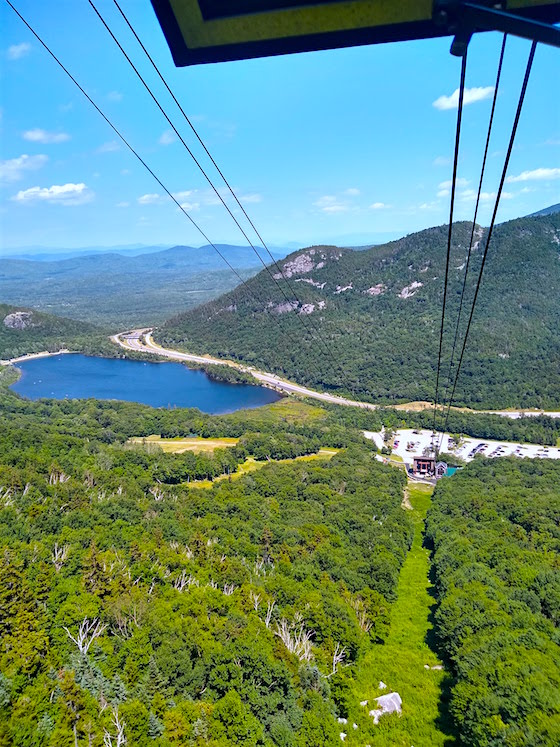
You’re looking at the infamous Franconia Notch as Jim and I ride up the tram to the top of Cannon Mountain. Out west they call these passes. I-93 passes right by Echo Lake and then starts to go downhill towards the Great North Woods in the upper left of the photo. Copyright 2019 Tim Carter W3ATB
“Tell me everything.”
That’s what I heard when I answered the phone yesterday morning. It was my pal and good friend Jim Cluett, W1PID. He wanted to know how we could take advantage of a stunning summer day here in central NH. The forecast was for 80 F and sunny skies.
We both know from experience that in just a few short months we’ll be longing for a warm sunny day as the November cold rains turn into dreadful December snow and ice.
“I don’t know about you, but I’m going to ride the tram up to the top of Cannon Mountain to work some European radio stations,” I spoke through my new Motorola G7 smartphone.

This tiny panoramic photo doesn’t do justice as what your eyes see when looking out across from Cannon Mountain to the majestic Lafayette Mountain on the other side of Franconia Notch. I KNEW we’d have a giant dish of eye candy waiting for us once we exited the tram. Copyright 2019 Tim Carter W3ATB
“What time are we leaving?” Jim blurted out after a momentary pause. His brain was whirring away at the possibilities the adventure might produce. Cannon Mountain is one of the top destinations because of the spectacular views and elevation achieved so easily by the 8-minute tram ride to the top.
He was so surprised by my suggestion he would have left right then if we could have.
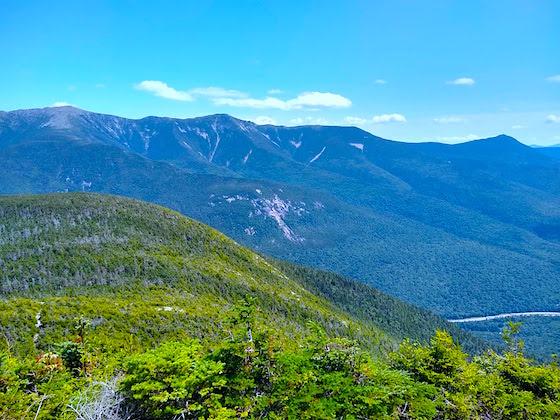
This is but one reason Jim was excited to leave to get to Cannon Mountain. This is the view you get of Mt. Lafayette just across from where you sit on the granite ledge. You feel as if you can reach out and touch it. Copyright 2019 Tim Carter W3ATB
What’s So Special About Cannon Mountain?
Cannon Mountain is a spectacular feature in the White Mountains of New Hampshire. The Old Man of the Mountain used to be on its eastern face, but he crashed to the granite talus in the valley below on May 3, 2003.
The tram to the top of Cannon Mountain is part of the magic. Just about every other peak in the White Mountains you have to invest lots of effort to get to the top. The tram delivers you to the top of Cannon Mountain in about eight minutes from the parking lot!
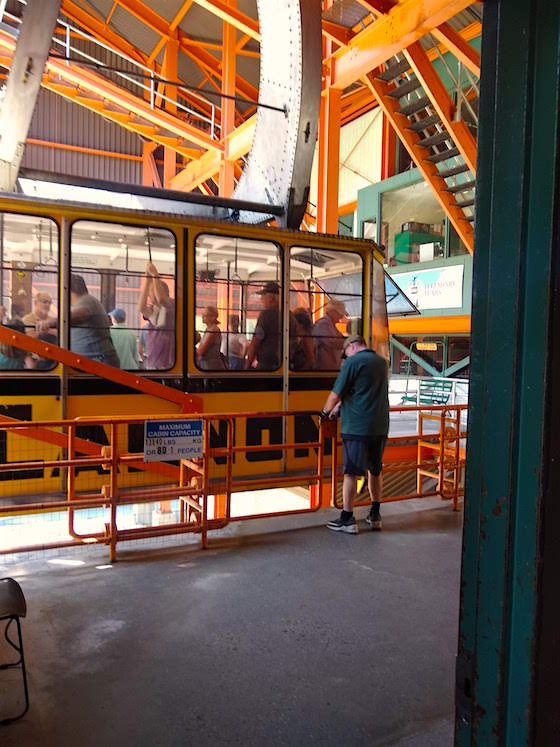
This is the tram car arriving at the lower base platform. It’s about to cough out passengers from the top like a bad hairball. My biggest suggestion is for the park employees to wash the windows of the tram each night. Copyright 2019 Tim Carter W3ATB
The Kinsman Ridge Trail
Once you arrive at the top of Cannon, you exit the tram building and walk down to the start of the loop trail. You just walk 150 feet, maybe 200, and you intersect where the Kinsman Ridge Trail comes up 1.7 miles from the bottom of the mountain.
Jim and I turned left to go down the Kinsman Ridge Trail for just another 150 feet. There we arrived at a narrow band of solid andesite granite ledge. Here we met two young women who had spent three hours getting from the bottom of the mountain to the top.
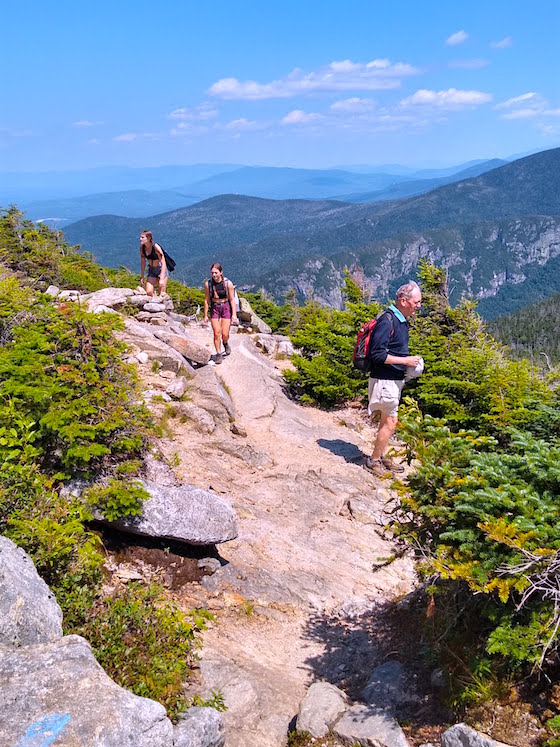
This is the last small section of the Kinsman Ridge Trail just below the summit of Cannon Mountain. These two young ladies were coming up from below just as Jim and I arrived. They had left the trailhead below three hours before but were so fit they looked like they had only been hiking ten minutes. Jim’s hair and shorts telegraph to you how breezy it was up there. I’d estimate a sustained 20 mph wind was blowing from the south. Copyright 2019 Tim Carter W3ATB
Lunch and The Antenna
It was 1 pm when we arrived at the vista point. Both of us were hungry, but I had brought no food. There’s a restaurant in the giant tram station at the top of Cannon, but Jim had offered me half of his vegan sandwich carefully prepared and wrapped in wax paper by his thoughtful wife.
I had never had a vegan sandwich and was terrified there could be wretched green peppers in it. I hate green peppers more than I hate sandworms, especially the ones on Venus.
Jim assured me there were no green peppers and I used my favorite Sog Flash II pocketknife to divide the sandwich in two using the plastic Tupperware® top as a cutting board. The sandwich was delicious, and I wished there were three more.
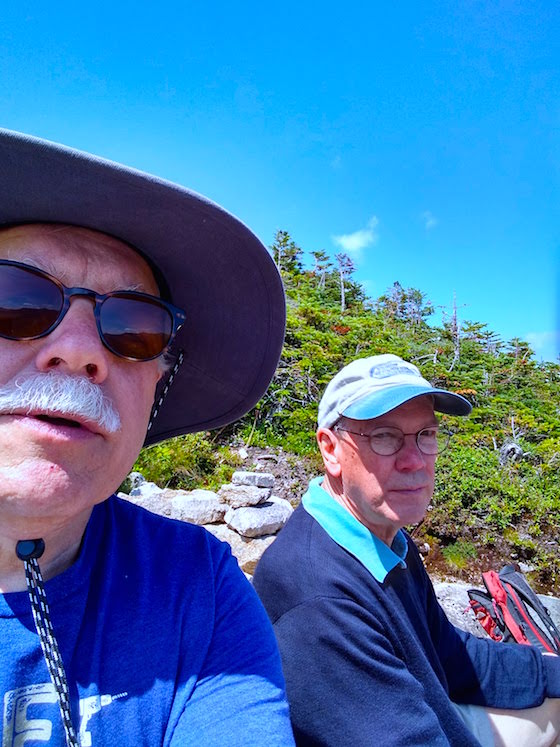
I’m in the sunglasses. Jim has the baseball cap on. You can see how serious amateur radio can be when DX QRP contacts are on the line! Copyright 2019 Tim Carter W3ATB
It’s important to realize that radio communications can be quite serious business. After all, an operator might travel a great distance, set up his equipment in less than ideal conditions only to discover the solar activity has rendered the atmosphere into a slothful sack of ions that have no interest in bouncing our radio signals to other parts of the world.
One thing I’ve discovered in the years of going on radio adventures with Jim is that each contact we make with another operator, especially ones thousands of miles away in Europe, is to be savored like the finest gourmet ice cream or candy one might get at Aglamesis Bro’s in Cincinnati, OH.
If you hear a station when they are few and far between on the bands, you want to capture them at any cost because you might not hear anyone else. It’s the same when given the opportunity to taste delicious candy. Fortunately, in the case of great candy, you can get it anytime you want. Aglamesis Bro’s will ship their delicious delights to all points in the USA. Oh what I would have given for a dark chocolate pecande yesterday, but I digress.
After eating, we immediately set up our antenna. We used Jim’s featherlight expanding fiberglass cane pole to hold up a 29-foot thin wire. It was in the shape of an inverted V. One end was tied around a small juniper branch and the other end I tied off to a loop at the top of Jim’s backpack using his explicit directions.
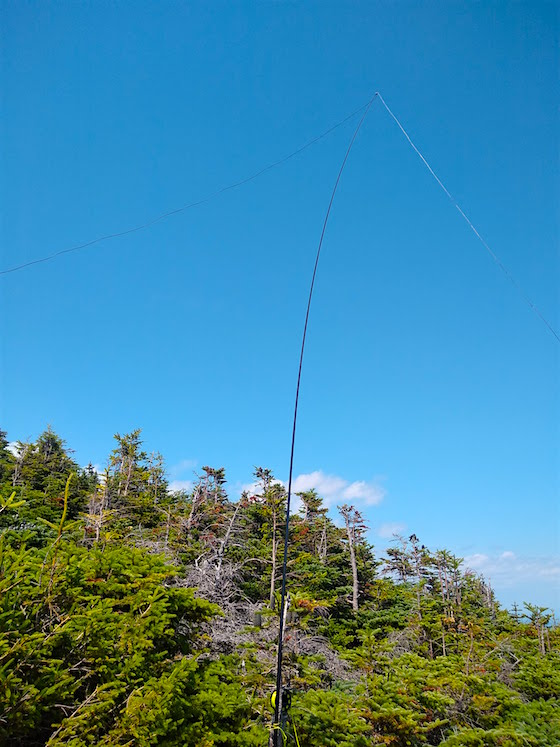
It might be hard to see the two thin wires, but they’re there. Being up 4,100 feet above sea level sure helps get our signal out and also allows us to better capture other radio transmissions. Copyright 2019 Tim Carter W3ATB
The antenna wires were flapping in the wind, but they never came loose. Jim connected the one end of the wire to his 9:1 unun and a short coax cable went from it to his Elecraft KX3. The radio was powered by a small Bioenno 3Ah lithium-iron-phosphate (LFP) battery.
Did You Hear Lots of Stations?
Jim turned on his radio and started out on 20 meters. Twenty meters is the go-to band for long-distance contacts. It was as quiet as a graveyard at three in the morning. Radio operators often lament this condition as the bands being dead.
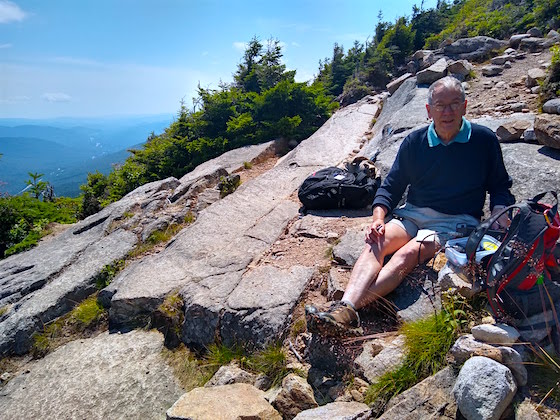
Here’s Jim trying to find other stations on the HF bands. When the weather is this nice, you don’t want to waste these days target shooting, that’s for sure! Copyright 2019 Tim Carter W3ATB
“Tim, there’s not one signal on 40 meters!”
“Well, did you try 30 meters?” I asked.
“Nothing. There’s nothing on 30 meters.”
“How about 17 meters?” I inquired.
“I checked already. Nothing there either.”
It was looking like a repeat of three days earlier when Jim and I had traveled south to Salem, Massachusetts to help out a special event station. We spent 90 minutes on the air that morning and got skunked. I was in a foul mood driving home that day!
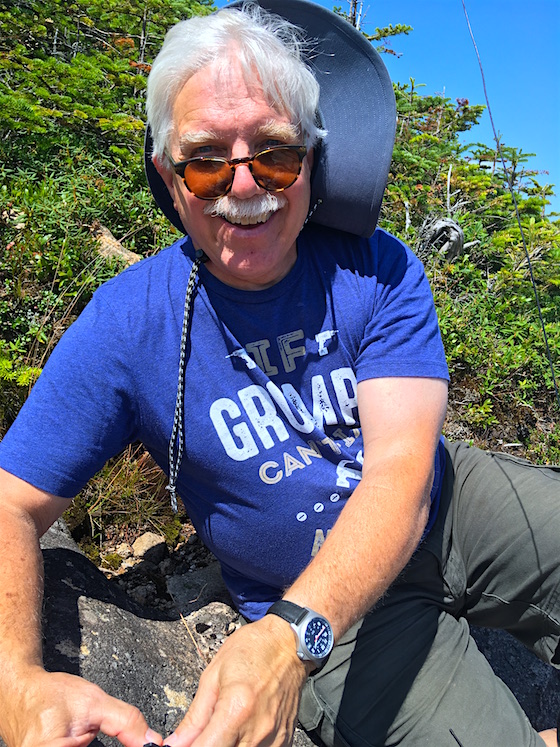
Here I am working Bert in France. I had to tilt back my wide-brimmed Duluth Trading hat and drop my sunglasses so Jim could see my eyes. Why was I complaining about lack of food? Hells bells, I’ve got enough under the lower part of my t-shirt to last two weeks or more. Maybe three! Copyright 2019 Jim Cluett W1PID
Bert to the Rescue
Moments later Jim got back on 20 meters and there was our dear friend Bert, F6HKA doing Morse code with another operator. Bert lives in France. What a delight to do DX from Cannon with a tiny radio and low power!
Jim and Bert have conversed countless times and he’s such a gentleman, Bert that is. Jim’s a great guy too, but always keep in mind his priorities when doing outdoor radio!
We both got to work Bert and we were relieved that we avoided the skunk. It’s always fun to send your callsign to Bert and he comes back with, “FB Tim”. FB means fine business in CW or Morse code.
Just as we equate immediately Bert’s callsign to his name, he does with us. This comradery is part of the attraction to the ham radio hobby. Keep in mind many of us have never met face-to-face.
Just after working Bert a husband and wife, we think, came up the trail from below. They were tired but astonished we were able to do ham radio from a mountain.
Germany!
When you set a low-powered radio in front of my dear friend Jim and do it in a stunning outdoor setting on a day where the sky is so blue it hurts your eyes to look at it, be prepared for an almost zen-like experience. Jim convinced me years ago that outdoor radio is magic and I don’t dispute it for a second.
“You know, I think we possibly take it for granted that we can just come out here to an outcrop, set up our radios, and make contact with others across the Atlantic Ocean. When strangers see us do this no doubt they’re very very curious,” I mused.
Seconds later a strong signal was heard! It was a special event station in Germany of all places, DM19BUGA. It was celebrating a national garden exhibition in Heilbronn, Germany. The operator was sending Morse quite fast, most certainly above 20 words per minute.
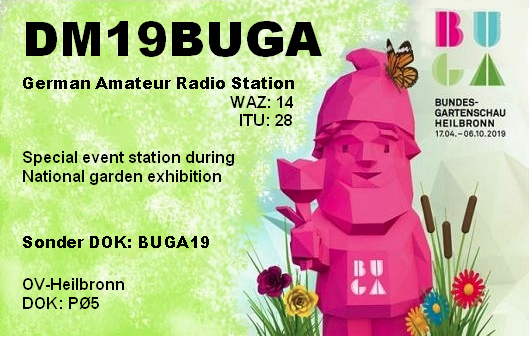
Here’s the special event QSL card you might get in the mail if you made contact with DM19BUGA. It’s gorgeous and Jim loves flowers. Copyright 2019 DM19BUGA
You can’t allow an operator like this to escape and he had a minor pileup happening. A pileup is when multiple stations answer another station’s signal at the same time. Stronger stations almost always overpower low-powered stations like us. Remember, we were transmitting at a power level, around 5 watts, that you might use to make a night light glow!
Seconds later a dad and his son came up the trail. The dad was most interested in our setup and I started to answer his questions as Jim focused all his energy on trying to make contact with the German operator.
With the wind blowing, and the real possibility that the German station’s signal could disappear into the ether, the intensity level grew faster than a speeding bullet. We HAD to make contact with the German station, but at the same time, I was trying to be polite to the hikers.
Looking back, I should have probably had a simple laminated sign that read, “Ham Radio – Harmful RF Waves – Move Along RAPIDLY for your Safety”. Nah, that’s too scary.
I think I’m going to have some small business cards printed up that say:
INTENSE Radio Comms in Progress
Please go to https://w3atb.com/qrp for details about what you see, especially a video about how the antenna was put far up in the air.
CLICK or TAP HERE to see all of the photos from our adventure yesterday.

I have to add “Operating with W3ATB and W1PID” to my bucket list.
Larry W2LJ
Larry,
I just mapped it. It’s a moderate 6-hour drive from your QTH to ours. I’d say the best time to come would be the week of September 15th. I’ll be doing QRP radio in NM from the 23rd to the 29th.
Just Do It. Get up here!
The KX3 is such a nice small radio for QRP setup.
I never heard anything about that match box end feed antenna.. Will have to take a look online…
73!
de VE2PF
Here’s a kit from Amazon where you can make one. There are many online plans showing how to wind the toroid. I prefer to use three separate wires with different colored insulation to ensure you connect the correct wire to the correct thing in the unun. Be sure you build one with a negative post on the outside of the box. I use this on mine to deploy a counterpoise wire. Jim’s unun does not sport this handy extra post.
https://amzn.to/2Yv78vB